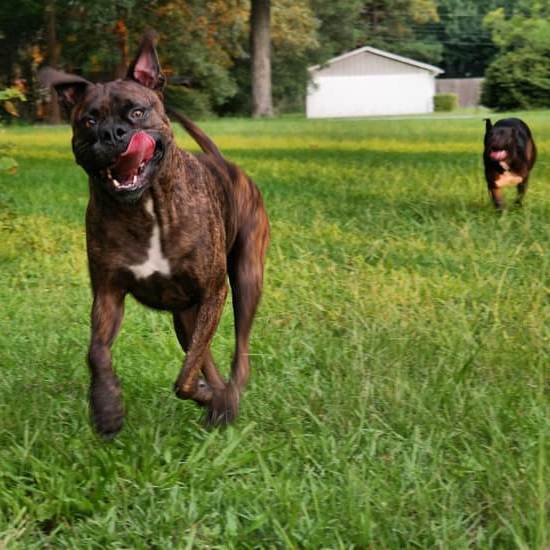If you’ve ever wondered how to train a rat dog, you’ve come to the right place. Rat dogs, also known as “ratties”, are intelligent and energetic little companions that can be trained to be well-behaved and obedient. In this article, we will explore everything you need to know about training your rat dog, from understanding their behavior and temperament to choosing the right training method and addressing common training challenges.
Rat dogs are a unique breed known for their affectionate nature and small size. They make excellent pets for individuals or families looking for a loyal and playful companion. However, like all dogs, proper training is essential to ensure they are well-adjusted and well-behaved members of the family.
Understanding the behavior and temperament of rat dogs is crucial in order to effectively train them. Each individual dog may have its own quirks and personality traits, so taking the time to understand your specific rat dog’s needs is important. In the following sections, we will delve deeper into how to tailor your training approach based on your rat dog’s unique characteristics.
Understanding the Rat Dog’s Behavior and Temperament
Rat dogs, also known as “ratter” or “terrier” dogs, are a unique breed with distinct behavioral characteristics. Understanding the behavior and temperament of rat dogs is essential in effectively training them. These small and energetic dogs are highly alert, intelligent, and possess a strong prey drive. They were originally bred for hunting and killing vermin like rats, mice, and other pests.
Prey Drive
One of the key behavioral traits of rat dogs is their strong prey drive. This means that they have a natural instinct to hunt and chase small animals such as rodents. It’s important for owners to be aware of this behavior when training their rat dog, as it can impact their response to commands and behaviors.
Energy Levels
Rat dogs are known for their high energy levels and require regular exercise to keep them physically and mentally stimulated. Without enough physical activity and mental enrichment, these dogs can become bored, restless, or even destructive. Finding ways to channel their energy through training exercises and playtime is crucial to preventing behavioral problems.
Socialization
Rat dogs are typically very loyal to their owners but may be wary of strangers or other animals. Proper socialization from an early age can help mitigate any potential aggression or fearfulness towards unfamiliar people or pets. Exposing your rat dog to different environments, experiences, and other animals in a controlled manner will help them develop confidence and good social skills.
Understanding these key aspects of rat dog behavior will lay the foundation for effective training methods tailored to their specific needs and tendencies. By recognizing the innate traits of rat dogs, owners can better address their behavior through appropriate training techniques that align with their natural instincts.
Choosing the Right Training Method for Your Rat Dog
Rat dogs, also known as “Rat Terriers,” are intelligent and energetic breeds that require proper training to ensure their well-being and happiness. When it comes to training a rat dog, it is important to choose the right training method that is suitable for their unique personality and behavior.
There are various methods and approaches to consider when training a rat dog, so it’s essential to understand the options available and select the one that best suits your dog’s needs.
Positive Reinforcement Training
One of the most effective and humane training methods for rat dogs is positive reinforcement. This method involves rewarding good behavior with treats, praise, or toys, which encourages the dog to repeat the desired behavior. Positive reinforcement helps build a strong bond between the owner and the rat dog, making training sessions enjoyable for both parties.
Clicker Training
Clicker training is another popular method used for training rat dogs. This technique involves using a clicker device to mark desired behaviors, followed by a reward. The clicker serves as a clear signal for the dog, indicating that they have performed the correct action. Clicker training can be very effective in teaching rats dogs specific commands and behaviors.
Behavioral Training
For some rat dogs with behavioral issues or challenges, behavioral training may be necessary. This approach focuses on modifying undesirable behaviors through understanding the root cause and implementing appropriate techniques to address them. Whether it’s dealing with aggression, separation anxiety or excessive barking, behavioral training can help improve the overall behavior of a rat dog.
By understanding the various training methods available for rat dogs and considering their individual needs and temperament, owners can select an approach that will best contribute to their pet’s development into a well-behaved companion.
Basic Commands and Obedience Training for Rat Dogs
Rat dogs, also known as ratters or terriers, are a type of small dog breed that is known for their intelligence and high energy levels. When it comes to training a rat dog, basic commands and obedience training are essential for creating a well-behaved and well-adjusted pet. In this section, we will discuss how to train a rat dog to follow basic commands and develop good behavior.
One of the first steps in training a rat dog is teaching them basic commands such as sit, stay, come, and heel. Rat dogs are known for their independent nature, so patience and consistency are key when teaching them these commands. Using positive reinforcement techniques such as treats or praise can be effective in getting your rat dog to respond to these commands.
In addition to basic commands, obedience training for rat dogs should also focus on leash manners and impulse control. Since rat dogs have a strong prey drive, it’s important to teach them not to chase after small animals or rodents while on walks. This can be achieved through consistent training and using distraction techniques to redirect their attention. With proper training, rat dogs can become well-behaved companions that are a joy to have around.
| Rat Dog Training Tips | Effective Techniques |
|---|---|
| Use positive reinforcement | Offering treats or praise for following commands |
| Be patient and consistent | Rat dogs respond well to routine and repetition |
| Focus on impulse control | Teach your rat dog not to chase small animals or rodents while on walks |
Potty Training and Housebreaking for Rat Dogs
Potty training and housebreaking are essential components of training for any dog, including rat dogs. The process can be challenging, but with consistency and patience, it is achievable. Just like with any other breed, the key to successfully potty training a rat dog lies in understanding their behavior and using the right techniques.
One effective method for potty training a rat dog is crate training. When done properly, crate training can help establish a routine for your dog and aid in their housebreaking process. It is important to remember that rats are intelligent animals, so positive reinforcement through treats and praise will go a long way in encouraging them to do their business outside.
Another crucial aspect of potty training and housebreaking for rat dogs is establishing a regular schedule for feeding, playtime, and bathroom breaks. By sticking to a consistent routine, you can help your rat dog understand when it’s time to go outside or use the designated area for elimination. Additionally, keeping a close eye on your rat dog’s behavior and body language will allow you to anticipate when they need to relieve themselves.
Overall, potty training and housebreaking a rat dog requires dedication and understanding of their needs as an individual animal. By utilizing the right methods and being patient with the process, you can effectively teach your rat dog where to go potty while strengthening your bond with them along the way.
If you’re wondering how to train a rat dog successfully in this aspect, remember that consistency, positive reinforcement, and attentiveness are key elements to achieving success in this area of their training.
Socialization and Behavior Modification for Rat Dogs
Once you have started the basic obedience training with your rat dog, it’s important to focus on their socialization and behavior modification. Rat dogs are known for their protective nature and can sometimes exhibit aggressive behavior towards strangers or other animals. Proper socialization and behavior modification can help address these issues and ensure that your rat dog is well-adjusted and safe to be around.
Socialization is the process of exposing your rat dog to different people, environments, and experiences in a positive way. This helps them feel more comfortable and confident in various situations, reducing their tendency towards fear-based aggression. It’s important to expose your rat dog to different people of all ages, other pets, different sounds, and environments from an early age. Positive reinforcement through treats, praise, and toys can help create positive associations with new experiences for your rat dog.
Behavior modification techniques can be used to address any aggressive or unwanted behaviors in your rat dog. This may involve desensitization exercises where you gradually expose your rat dog to the trigger of their aggression in a controlled manner.
For example, if your rat dog exhibits aggression towards other dogs, you can start by keeping a safe distance from other dogs while rewarding calm behavior. Over time, you can slowly reduce the distance until they are comfortable being around other dogs.
By focusing on socialization and behavior modification, you can help your rat dog become a well-adjusted and friendly member of the family. Consistency, patience, and positive reinforcement are key when training a rat dog or any other breed for that matter; it may take time but it will make a huge difference in the long run as proper training is essential no matter how old they are.
Remember that every animal learns at its own pace so never rush through training processes such as this one It also takes commitment from everyone living with the pet since having different orders might confuse it.
Exercise and Mental Stimulation for Rat Dogs
Rat dogs, also known as toy breeds, are full of energy and require regular exercise and mental stimulation to keep them happy and healthy. In this section, we will explore the importance of exercise and mental stimulation for rat dogs, as well as provide tips on how to incorporate these into your daily routine.
Exercise is essential for rat dogs to maintain a healthy weight, prevent boredom, and release pent-up energy. Taking your rat dog for a daily walk or engaging in playtime activities such as fetch or agility training can help meet their exercise needs. Additionally, providing them with interactive toys and puzzles can keep them mentally stimulated while also getting some physical activity.
Mental stimulation is just as important for rat dogs as physical exercise. Engaging their minds through training sessions, puzzle toys, or scent work can help prevent behavioral issues such as excessive barking or destructive chewing. Consider incorporating obedience training or teaching new tricks to keep their brains active and engaged. Moreover, socializing your rat dog with other animals and people can provide mental stimulation through new experiences and interactions.
By understanding the unique needs of rat dogs when it comes to exercise and mental stimulation, you can ensure that they lead a fulfilling and enriched life. Keep in mind that every rat dog is different, so it’s important to tailor their exercise routine and mental stimulation activities to their individual personality and energy levels. Following these tips on how to train a rat dog will help you create a happy and well-rounded companion for years to come.
Troubleshooting Common Training Challenges With Rat Dogs
Rat dogs, also known as terriers, are known for their high energy, intelligence, and strong-willed nature. While these qualities make them great companions, they can also present some common training challenges. If you’re struggling with obedience training or behavior modification with your rat dog, it’s important to understand that each dog is unique and may require different approaches to training. Here are some common training challenges with rat dogs and how to troubleshoot them effectively:
- Stubbornness: Rat dogs are known for their independent nature, which can make them appear stubborn during training sessions. To overcome this challenge, it’s important to be patient and consistent in your training approach. Use positive reinforcement techniques such as treats and praise to motivate your rat dog to follow commands.
- Aggression: Some rat dogs may display aggressive behavior towards other animals or even people. To address this issue, it’s crucial to socialize your rat dog from a young age and expose them to different environments and experiences. Additionally, seeking the help of a professional trainer or behaviorist can provide invaluable guidance in modifying aggressive behavior.
- Barking: Rat dogs are avid barkers, which can become a nuisance if not properly managed. To address excessive barking, provide mental stimulation through interactive toys and engage in regular exercise to channel their energy positively. Using distraction techniques and teaching the “quiet” command can also help minimize barking behavior.
By understanding the root cause of these common training challenges and implementing effective troubleshooting strategies, you can create a harmonious relationship with your rat dog while promoting positive behavior patterns.
Remember that patience, consistency, and positive reinforcement are key elements in overcoming training challenges with rat dogs. With dedication and the right approach tailored to your individual dog’s needs, you can successfully train your rat dog to be a well-behaved and obedient companion.
Conclusion
In conclusion, training a rat dog can be a rewarding and fulfilling experience for both the owner and the furry companion. Understanding the behavior and temperament of rat dogs is crucial in choosing the right training method that suits their individual needs. Whether it’s basic commands and obedience training, potty training, socialization, or troubleshooting common training challenges, patience, consistency, and positive reinforcement are key in successfully training a rat dog.
When it comes to understanding how to train a rat dog, it’s important to remember that every dog is unique and may require different approaches to training. It’s essential to tailor the training method to fit the specific personality and behavior of your rat dog. By providing ample exercise and mental stimulation, as well as proper socialization and behavior modification when needed, you can create a happy and well-trained rat dog.
In the end, creating a happy and well-trained rat dog involves investing time, effort, and patience into their training. With the right approach and dedication, owners can establish a strong bond with their rat dogs while fostering good behavior and obedience. Remember that consistent training efforts will lead to a lifetime of enjoyment with your well-trained companion.

Welcome to the blog! I am a professional dog trainer and have been working with dogs for many years. In this blog, I will be discussing various topics related to dog training, including tips, tricks, and advice. I hope you find this information helpful and informative. Thanks for reading!





